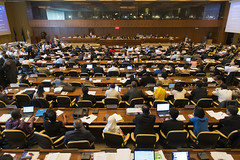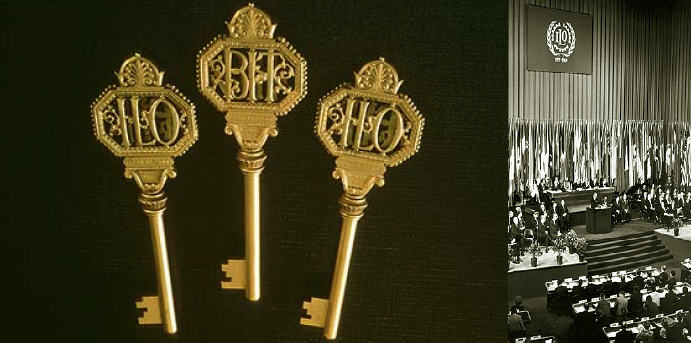- Key documents
Forced Labour
Convention, 1930 (No. 29)
“This
fundamental convention prohibits all forms of forced or compulsory labour […]
Exceptions are provided for work required by compulsory military service,
normal civic obligations, as a consequence of a conviction in a court of
law […], in cases of emergency, and for minor communal services performed
by the members of a community in the direct interest of the community. The
convention also requires that the illegal extraction of forced or
compulsory labour be punishable as a penal offence, and that ratifying
states ensure that the relevant penalties imposed by law are adequate and strictly
enforced.” ( Rules
of the game: A brief introduction to International Labour Standards, p. 28)
In
June 1994, at the 81st Session of the International Labour
Conference, a clear consensus emerged among ILO’s constituents to step up
promotion of fundamental social rights. The World
Summit for Social Development, held in Copenhagen in March 1995, bolstered ILO’s
efforts by inviting the governments to protect and promote “respect for the
fundamental rights of workers”. It was in this favourable international
context that ILO defined as “fundamental” the conventions dealing with
matters considered to be fundamental principles and rights at work. On 25
May 1995, ILO Director-General Michel
Hansenne, sent a letter to the
Member States with a view to obtaining universal ratification of these
fundamental conventions, of which there were seven at the time. The ILO
Declaration on Fundamental Principles and Rights at Work (1998), a promotional instrument drawn up specifically to strengthen
application of the fundamental legal principles for social justice, provided
a considerable boost to the ratification campaign.
In 2008, ILO Director-General Juan Somavia, drew attention to the
importance of accelerated ratification of the fundamental conventions and proposed
the goal of universal ratification by 2015. (See Ratification and promotion of fundamental ILO conventions,
p. 1)
There are currently eight fundamental conventions:
- Forced Labour Convention, 1930 (No. 29)
- Freedom of Association and Protection of the Right to Organize Convention, 1948 (No. 87)
- Right to Organize and Collective Bargaining Convention, 1949 (No. 98)
- Equal Remuneration Convention, 1951 (No. 100)
- Abolition of Forced Labour Convention, 1957 (No. 105)
- Discrimination (Employment and Occupation) Convention, 1958 (No. 111)
- Minimum Age Convention, 1973 (No. 138)
- Worst Forms of Child Labour Convention, 1999 (No. 182)
|
 |
 |
 |
 |












